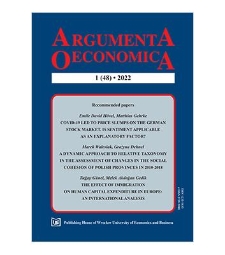Dolnośląska Biblioteka Cyfrowa udostępnia 110 253 obiektów cyfrowych
Obiekt
Tytuł: COVID-19 led to price slumps in the German stock market. Is sentiment applicable as an explanatory factor?
Autor:
Hövel, Emile David ; Gehrke, Matthias
Opis:
Argumenta Oeconomica, 2022, Nr 1 (48), s. 1-35
Abstrakt:
Wydawca:
Publishing House of Wroclaw University of Economics and Business
Miejsce wydania:
Data wydania:
Typ zasobu:
Identyfikator zasobu:
doi:10.15611/aoe.2022.1.01 ; oai:dbc.wroc.pl:115005
Język:
Powiązania:
Argumenta Oeconomica, 2022, Nr 1 (48)
Prawa:
Pewne prawa zastrzeżone na rzecz Autorów i Wydawcy
Prawa dostępu:
Dla wszystkich zgodnie z licencją
Licencja:
CC BY-SA 4.0
Lokalizacja oryginału:
Tytuł publikacji grupowej:
Kolekcje, do których przypisany jest obiekt:
- Dolnośląska Biblioteka Cyfrowa > Uczestnicy Konsorcjum > 04. Uniwersytet Ekonomiczny we Wrocławiu > Czasopisma wydawane przez Wydawnictwo UEW > Argumenta Oeconomica
- Dolnośląska Biblioteka Cyfrowa > Zasoby > 2. Czasopisma > Czasopisma współczesne
Data ostatniej modyfikacji:
17 kwi 2024
Data dodania obiektu:
26 maj 2022
Liczba wyświetleń treści obiektu:
631
Wszystkie dostępne wersje tego obiektu:
https://dlibra.kdm.wcss.pl/publication/154794
Wyświetl opis w formacie RDF:
Wyświetl opis w formacie OAI-PMH:
| Nazwa wydania | Data |
|---|---|
| COVID-19 led to price slumps in the German stock market. Is sentiment applicable as an explanatory factor? | 17 kwi 2024 |
Obiekty Podobne
Kliber, Agata Rutkowska, Aleksandra
Rutkowska, Aleksandra
Smolarkiewicz, Marcin Buczko, Jerzy. Redakcja Pietkiewicz, Jerzy Jan. Redakcja
Brzeszczyński, Janusz Gajdka, Jerzy Ali, M.Kutan
Maciejasz-Świątkiewicz, Marta
























